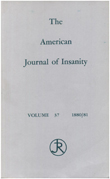Clinical correlates of early-onset and late-onset poststroke generalized anxiety
Abstract
OBJECTIVE: The authors' goal was to determine if generalized anxiety diagnosed while a patient was hospitalized for stroke (early onset) had the same clinical correlates as anxiety beginning 3 months or more after the stroke (late onset). METHOD: Patients with acute stroke (N = 142) were examined while they were in the hospital and 3, 6, 12, and 24 months later for the presence of anxiety symptoms. Patients underwent a structured psychiatric interview as well as assessment of cognitive, physical, and social function at each visit. Patients with early-onset and late-onset poststroke generalized anxiety were identified and compared to patients without poststroke generalized anxiety. RESULTS: The frequency of early-onset poststroke generalized anxiety was 27% and that of late-onset poststroke generalized anxiety was 23%. Three- quarters of the anxious patients had comorbid major or minor depression. Patients who developed early-onset or late-onset poststroke generalized anxiety were no more socially, cognitively, or physically impaired than patients who did not develop anxiety. Early-onset but not late-onset anxiety was associated with a previous history of psychiatric disorder. The median duration of late-onset anxiety was 3.0 months, and that of early-onset anxiety was 1.5 months. The presence of anxiety was significantly associated with depression; onset of depression and onset of anxiety occurred at approximately the same time. CONCLUSIONS: These findings suggest that although early-onset and late-onset poststroke generalized anxiety are phenomenologically similar, they may be the result of different pathophysiological mechanisms.
Access content
To read the fulltext, please use one of the options below to sign in or purchase access.- Personal login
- Institutional Login
- Sign in via OpenAthens
- Register for access
-
Please login/register if you wish to pair your device and check access availability.
Not a subscriber?
PsychiatryOnline subscription options offer access to the DSM-5 library, books, journals, CME, and patient resources. This all-in-one virtual library provides psychiatrists and mental health professionals with key resources for diagnosis, treatment, research, and professional development.
Need more help? PsychiatryOnline Customer Service may be reached by emailing [email protected] or by calling 800-368-5777 (in the U.S.) or 703-907-7322 (outside the U.S.).



